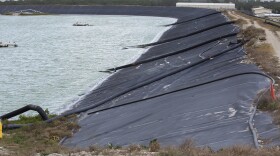-
The troubled plant in Manatee County has caused environmental problems for Tampa Bay since the 1970s. We take a tour of the site, where workers are within months of shutting it down.
-
There are concerns Hurricane Milton could impact phosphogypsum plants in the state. A leak in 2021 resulted in the release of around 215 million gallons of polluted water into Tampa Bay.
-
A federal judge has ruled in favor of several environmental groups that sued the Piney Point phosphate plant. Hundreds of millions of gallons of polluted water flowed into Tampa Bay following a leak there in 2021.
-
They filed the federal lawsuit after around 215 million gallons of wastewater was discharged into Tampa Bay in 2021. It said the discharges caused harmful algae blooms and fish kills.
-
The leak happened after an electrical circuit breaker tripped on a facility being used to pump polluted water deep under the drinking water aquifer.
-
A milestone was reached Thursday, as one of the wastewater ponds atop the Piney Point phosphate plant was closed. This means the troubled plant is one step closer to being closed - forever.
-
One of the ponds atop the phosphogypsum stack is almost empty of water. That should prevent a repeat of the 2021 release of polluted water into nearby Tampa Bay.
-
It’s proof that the plume of dirty water flowed from the former phosphate plant and out into the Gulf of Mexico, the study’s authors say.
-
Said Rep. Anna Eskamani, D-Orlando: "I am concerned that our approach is one that does not take in consideration health risks.”
-
Florida is home to 24 phosphogypsum (PG) stacks. PG is a radioactive, solid waste byproduct. The House has approved a bill to study whether PG could be used in road construction.
-
The digging of a deep well at the troubled Piney Point phosphate plant in Manatee County has been completed. Now, workers are injecting 1 million gallons of polluted water deep underground, every day. WUSF takes a tour of the site, to see what's being done to make sure huge spills don't happen again.
-
Here are the key developments at the troubled Piney Point phosphate plant, including a spill that prompted officials to pump more than 200 million gallons of the reservoir’s polluted water into Tampa Bay.
Play Live Radio
Next Up:
0:00
0:00
Available On Air Stations











